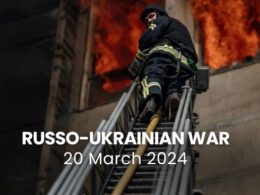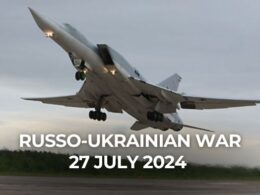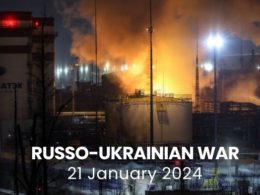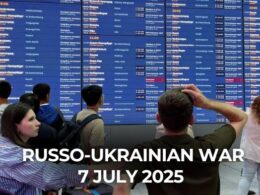Meanwhile, the Ukrainian military command, hoping for yet-to-be-negotiated prisoner exchanges, ordered the remaining defenders of Azovstal to surrender, which generated outrage in the Russian information space and demands in the Russian parliament for laws prohibiting exchanging the surrendered defenders of Azovstal.
Morning report day 84 – May 18
The report is based on media reports, expert analyses, and official information posted online.
Situation
According to information from the General Staff as of 06.00 18.05.2022, supplemented by its [18:00 assessment].
“[Russian forces do not stop conducting offensive operations in the Eastern Operational Zone.]
Russian forces are firing along the entire line of contact and in the depths of the defence of Ukrainian troops in the Donetsk operational area and the Sloviansk direction, taking measures to strengthen the offensive group.
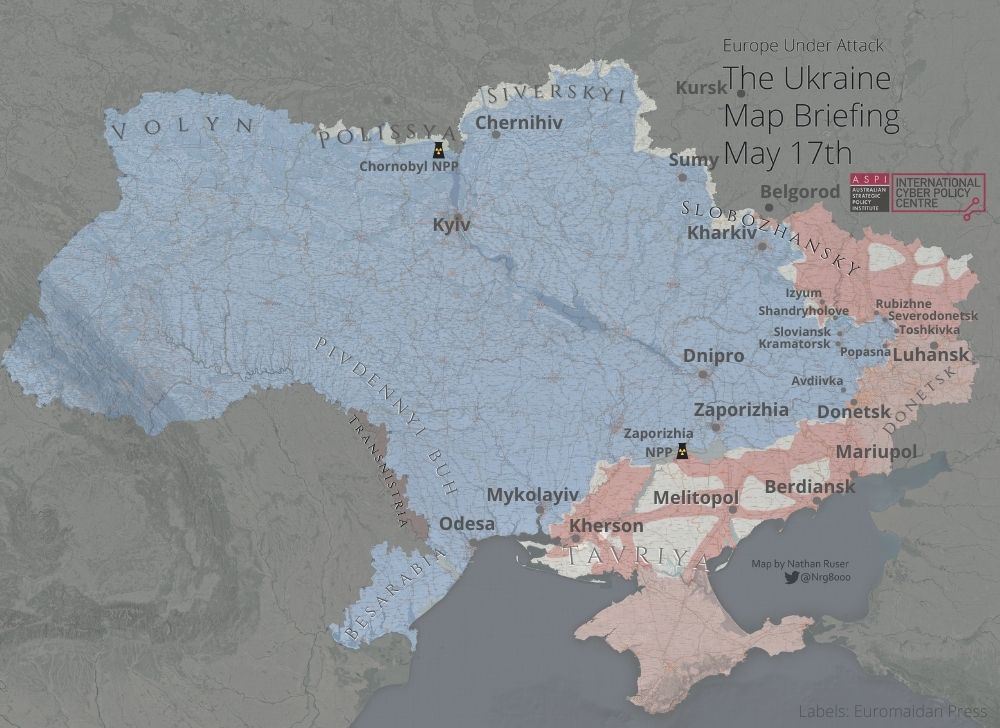
In other areas, Russian forces’ main focus is on maintaining previously occupied frontiers, conducting reconnaissance, engineering equipment positions, replenishing stocks, and trying to improve its tactical position.
Russian invaders continue to launch missile strikes on military and civilian targets throughout Ukraine.
[No significant changes in the position and condition of Russian forces’ troops were recorded in the Volyn, Polissia and Siverskyi directions.] Units of the Armed Forces of the Republic of Belarus are carrying out tasks to strengthen the Ukrainian-Belarusian border in the Brest and Gomel regions. The threat of missiles and airstrikes on the objects of our State from the territory of Belarus remains.
- To demonstrate the presence and restraint of units of the Defence Forces of Ukraine, the enemy continues to maintain units of the Armed Forces of the Russian Federation in the border areas of Bryansk and Kursk oblasts. In some areas, Russian forces strengthen the system of air defence and engineering equipment positions.
- Russian forces continue to shell artillery positions of Ukrainian troops and civilian infrastructure in the border settlements of Chernihiv and Sumy oblasts.
- [The Armed Forces of the Republic of Belarus are continuing the measures of the second stage of the combat readiness test. As part of these activities, training in pontoon crossing and forcing a water obstacle was marked at one of the training fields.]
In the [Slobozhanskyi direction], Russian forces focused on maintaining their positions and preventing the further advance of our troops. Russian aggressor is carrying out artillery shelling of the settlements of Tsyrkuny, Ruski Tyshky, Cherkasy Tyshky, and Pytomnyk.
- In the Sloviansk direction, Russian forces are attacking the village of Dovhenke. To support the offensive in a certain area deployed jet and artillery units. [Yesterday Russian forces attempted to improve the tactical situation in the area of Dovhenke but were unsuccessful.]
- To provide logistical support and replenish the units that suffered casualties, the Russian aggressor moved weapons and military equipment from the territory of the Russian Federation.
In the Donetsk direction, Russian forces continue to attack in the Lyman, Sievierodonetsk, Bakhmut, Avdiivka and Kurakhove directions.
- In the Lyman direction, Russian forces launched an offensive to establish full control over the settlement of Drobysheve and blockade the Lyman from the north.
- In the Bakhmut and Sievierodonetsk directions, the Russian aggressor concentrated up to fifteen helicopters in Luhansk Oblast to support the offensive.
- [In the Sievierodonetsk direction, with the support of artillery, Russian occupiers are trying to launch an offensive in the direction of the settlements of Borovenky and Sievierodonetsk.]
- [In the Bakhmut direction, Russian forces tried to break through the defences of our troops, were unsuccessful, and withdrew.]
- [In the areas of Bakhmut, Klynovy, Soledar, and Vovchoyarivka, the enemy fired missiles from Su-35 aircraft. The enemy also conducted air reconnaissance using UAVs "Orlan-10".]
- [In the Avdiivka direction, Russian forces carried out assault operations in order to take control of the Novobahmutivka-Novoselivka Druha road but were unsuccessful.]
- [In the Kurakhove direction, with the support of artillery and aircraft fire, Russian forces are attacking the village of Novomykhailivka, fighting continues.]
- [Occupying Russian units made an unsuccessful attempt to advance in the direction of Mariinka.]
- In Mariupol, Russian forces are focusing their efforts on blocking our units near the Azovstal plant. Continues to inflict artillery and airstrikes.
- Twelve enemy attacks were repulsed in the Donetsk and Luhansk directions over the past 24 hours, three tanks, three artillery systems, six units of armoured combat vehicles and seven enemy vehicles were destroyed.
In the Novopavlovsk and Zaporizhzhia directions, Russian forces reinforce groups of troops to conduct an offensive in the direction of Polohy - Orikhove.
- [In order to bind our troops, it fired with the use of artillery and mortars. At the same time the enemy carries out engineering equipment for the second line of defence.]
In the Pivdennyi Buh direction, Russian forces focus their main efforts on maintaining the occupied frontiers, conducting reconnaissance, engineering equipment of positions and firing on units of our troops.
- [Russian occupiers are continuing engineering work to equip the second line of defence with reinforced concrete structures.]
- Russian occupiers deployed up to ten batteries of MLRS and eight batteries of barrel artillery in the Mykolaiv direction for the defeat of the Ukrainian army.
- In the Kryvyi Rih direction, Russian troops conducted demonstrations to bind Ukrainian troops, improve engineering equipment and replenish supplies.
- In the Besarabian direction, the situation in the Transnistrian region of the Republic of Moldova remains tense and has not changed significantly.
Ships of the Black Sea Fleet in the Black and Azov Seas continue to perform tasks to isolate the area of hostilities, surveillance and fire support in the coastal direction.
- [Russian Black Sea Fleet performs tasks to isolate combat areas and block civilian shipping.]
On the previous day, the air defence units of the Land Forces hit ten UAVs of operational and tactical level, and anti-aircraft missile units of the Air Force destroyed one UAV and four cruise missiles.
[In the temporarily occupied territory of Crimea, measures are being taken to restore the combat capability of Russian units that have suffered significant losses. Thus, according to available information, combat coordination of units of the 126th Separate Coastal Defense Brigade and the 810th Separate Marine Brigade is planned at some training landfills of the peninsula.]”
Russians trying to break through the border in Sumy Oblast, the Ukrinform reports.
"The battle continues in the north of Shostka district. There is an attempt to break through the state border in the area of Seredyno-Buda," Head of the Sumy Regional Military Administration Dmytro Zhyvytskyy posted on Telegram. Zhyvytskyy stressed that the shelling of the region from the territory of Russia had been going on since the morning.“
Territorial Defence Chief of Staff: Most territorial defence brigades engaged in combat, the Ukrainska Pravda reports. "Fighters from territorial defence units have taken an active part in combat against the enemy since practically the first day of Russia’s full-scale aggression. Today, around 25 out of 32 territorial defence brigades are taking part in combat action either with their full complement or in part," Serhii Sobko, Territorial Defence Chief of Staff, said according to Ukrinform.
Head of Luhansk Oblast Military Administration: Russians are already scared to advance on Bilohorivka and no longer force their way across Siverskyi Donets, the Ukrainska Pravda reports. Russian military personnel are refusing to approach Bilohorivka (Luhansk Oblast) and they are no longer attempting to force their way across the Siverskyi Donets river because it is "scary" for them, Serhii Haidai, Head of Luhansk Oblast Military Administration, claim on Telegram.
Russian military again fires missiles at the bridge over Dniester Estuary, the Ukrinform reports. “Two more cruise missiles hit the bridge over the Dniester Estuary, which had not been operated for over two weeks,” the Spokesperson for South Operational Command, Vladyslav Nazarov, wrote on Facebook. In his words, the bridge was damaged so heavily that “repair works would require a lot of time and efforts. But now it is impossible to conduct them, same as to operate the bridge.” The bridge suffered missile strikes on April 26, April 27, May 2 and May 10, 2022.
Melitopol: Guerrillas kill high-ranking Russian military - Oblast Military Administration, the Ukrainska Pravda reports, citing Zaporizhzhia Oblast Military Administration.
According to British Defence Intelligence, (last 24 hours):
- Despite Russian forces having encircled Mariupol for over ten weeks, staunch Ukrainian resistance delayed Russia’s ability to gain full control over the city.
- In attempting to overcome Ukrainian resistance, Russia has made significant use of auxiliary personnel. This includes the deployment of Chechen forces, likely consisting of several thousand fighters primarily concentrated in the Mariupol and Luhansk sectors.
- These forces likely consist of both individual volunteers and National Guard units, which are routinely dedicated to securing the rule of Chechen Republic Head, Ramazan Kadyrov. Kadyrov likely maintains close personal oversight of the deployment, while his cousin Adam Delimkhanov has likely acted as the Chechen field commander in Mariupol. The combat deployment of such disparate personnel demonstrates Russia's significant resourcing problems in Ukraine and is likely contributing to a disunited command which continues to hamper Russia’s operations.
As of Wednesday 18 May, the approximate losses of weapons and military equipment of the Russian Armed Forces from the beginning of the war to the present day:
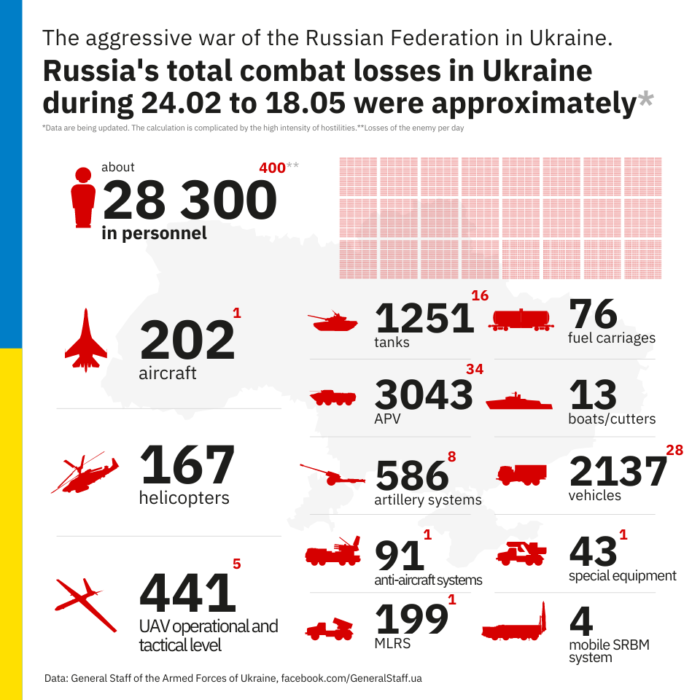
Russian enemy suffered the greatest losses (of the last day) in the Sloviansk, Kryvyi Rih, and Zaporizhzhia directions.
Humanitarian
Fears for Mariupol defenders after surrendering to Russia, the Reuters reports. Russia said at least 256 Ukrainian fighters had "laid down their arms and surrendered", including 51 severely wounded. Ukraine said 264 soldiers, including 53 wounded, had left. The Kremlin said Putin had personally guaranteed the prisoners would be treated according to international standards, and Ukrainian officials said they could be exchanged for Russian captives.
“Russian Deputy Ambassador to the United Nations Dmitry Polyansky said there had been no deal, tweeting: "I didn’t know English has so many ways to express a single message: the #Azovnazis have unconditionally surrendered."
TASS news agency reported a Russian committee planned to question the soldiers, many of them members of the Azov Battalion, as part of an investigation into what Moscow calls "Ukrainian regime crimes".
High-profile Russian lawmakers spoke out against any prisoner swap. Vyacheslav Volodin, speaker of the State Duma, Russia's lower house, said: "Nazi criminals should not be exchanged."
Lawmaker Leonid Slutsky, one of Russia's negotiators in talks with Ukraine, called the evacuated combatants "animals in human form" and said they should be executed.”
[ME: Given the atrocities that have been revealed after the liberation of Russian occupied territories the promise to treat the prisoners according to “international standards” offers, unfortunately, limited comfort. According to Russia, its so-called “special military operation” in Ukraine “agrees with international law and the UN Charter”.]
According to UNHCR 6,266,844 refugees have been registered as of May 16. The UN says that so far Poland has taken in 3,376,992 refugees, Romania 924,869, Russian Federation 850,534, Hungary 610,076, Republic of Moldova 464,294, Slovakia 424,027 and Belarus 27,308. Among those who fled Ukraine are also Ukrainian nationals with dual citizenship. An additional 105,000 people moved to the Russian Federation from Donetsk and Luhansk oblasts between 18 and 23 February.
The number of Ukrainians entering Ukraine since February 28 is 1,820,500 as of May 16. This figure reflects cross-border movements, which can be pendular, and does not necessarily indicate sustainable returns.
OHCHR recorded 7,814 civilian casualties in Ukraine as of May 16. 3,752 were killed (including 250 children) and 4,062 injured (including 365 children).
Environmental
Ukraine and its partners are working to overcome the global food crisis caused by Russia's aggression and blockade, the Ukrinform reports citing Ukrainian Foreign Minister Dmytro Kuleba. "The only reason for the restrictions on Ukrainian food exports is the Russian aggression against our country and its illegal blockade of Ukrainian seaports. Russia is threatening world food security with its criminal actions.
“Despite the difficult circumstances, Ukraine is making every effort to meet its contractual obligations and supply food to global consumers, particularly through the use of the EU infrastructure, the Ukrainian Foreign Ministry's press service quoted Kuleba as saying. The minister said that Ukraine has already agreed with the EU countries to develop alternative ways to supply Ukrainian food exports to global markets.”
[ME: Moving the goods from sea to land transport is a tremendous – if not impossible - challenge not only because of the volume of the agricultural exports, but also the state of the infrastructure and the number of trucks and railway wagons required. According to the Minister of Infrastructure, Ukraine has lost 23% of the railway network, including the loss of 6.3 thousand km of main tracks, damage to 23,573 km of roads, and damage to 289 automobiles and 41 railway bridges.]
Legal
ICC confirms ‘largest ever’ field deployment to probe war crimes in Ukraine, The Washington Post reports. “The International Criminal Court has sent a team of 42 investigators, forensic experts and support staff to Ukraine to probe potential war crimes, the court’s chief prosecutor said in a statement Tuesday. The group represents the “largest ever single field deployment” since the office began its work in 2003, ICC Prosecutor Karim Khan said in the statement. The team in Ukraine will work to advance the ICC’s probe, which began in March, as well as the efforts of Ukrainian authorities to investigate Russian war crimes.
“Now more than ever we need to show the law in action. It is essential that we demonstrate to survivors and the families of victims that international law is relevant to their experience, that the ideals of the Rome Statute can be applied meaningfully in order to bring them some measure of solace through the process of justice,” Khan said. The Rome Statute, which established the ICC, gave the court jurisdiction to investigate and prosecute the most serious violations of international law, including genocide and war crimes.”
In the occupied Luhansk Oblast, "conscripts" were threatened with execution for dodging draft, the Ukrinform reports. In the temporarily occupied territory of Luhansk Oblast, Russian forces have launched a forcible draft of the local population. For refusing to fight against Ukraine, the invaders threaten to execute male residents. This was announced by the Verkhovna Rada Commissioner for Human Rights, Liudmyla Denisova, via Telegram, Ukrinform reports. According to Denisova, forcible mobilization of the inhabitants of the occupied territories is prohibited by Article 51 IV of the Geneva Convention relative to the Protection of Civilian Persons in Time of War.
Over 1.3M Ukrainians have already been deported to Russia – Ombudsperson, the Ukrinform reports. "The key topic for discussion with the UNHCR chief was the forcible deportation to Russia of more than 1,300,000 Ukrainians, including 223,000 children. I noted that long before the full-scale military invasion, the Russian Federation had been preparing to deport Ukrainian citizens to its territory," the Verkhovna Rada Commissioner for Human Rights, Liudmyla Denisova, wrote on Telegram following an online meeting with the UN High Commissioner for Refugees Filippo Grandi.
According to Denisova, the directives on arranging a temporary stay of Ukrainians have been sent across Russia’s federal districts.
"I have documentary evidence of this with the addresses, names of responsible persons, the number of locations available in each. Today, 33% of locations in Russia are yet to be filled, so they are obviously not going to stop," said the ombudsperson.
In accordance with the resolution of the UN Human Rights Council, Russia must provide international human rights watchdogs, including UN institutions, unimpeded access to Ukrainian citizens who have been taken to Russia, Denisova noted, adding that UNHCR should play a key role in implementing such measures. For his part, Grandi noted that currently the Office has no access to Ukrainians held in Russia.”
Tens of thousands of Ukrainians are held in Russian camps, the Ukrinform reports. They are held in camps on Russian territory that were created according to the Nazi model, Ukrainian President Volodymyr Zelensky said in his virtual address to the Cannes Film Festival opening ceremony. He noted that every week mass graves of killed and tortured people are found in Ukrainian territories that were earlier captured by Russian troops or continue to be occupied.
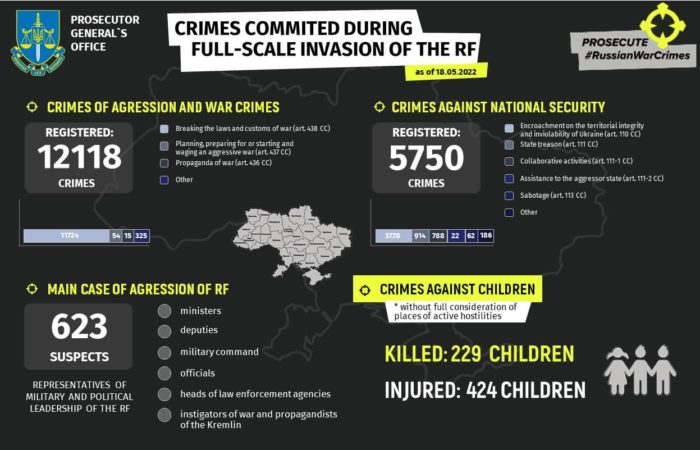 229 children were killed, and 424 children injured, the Office of the Prosecutor General of Ukraine reports as of May 18. 1,772 educational establishments are damaged as a result of shelling and bombings, 161 of them are destroyed fully. 12,118 crimes of aggression and war crimes and 5,750 crimes against national security were registered.
229 children were killed, and 424 children injured, the Office of the Prosecutor General of Ukraine reports as of May 18. 1,772 educational establishments are damaged as a result of shelling and bombings, 161 of them are destroyed fully. 12,118 crimes of aggression and war crimes and 5,750 crimes against national security were registered.
Support
US Secretary of the Treasury calls on Europe to increase financial support to Ukraine, the Ukrinform reports. “Our joint efforts are critical to helping ensure Ukraine’s democracy prevails over Putin’s aggression,” US Secretary of the Treasury Janet L. Yellen said at the Brussels Economic Forum, the Department of the Treasury informs.
“As the Secretary underscored, Ukraine needs budget funding to pay soldiers, employees, and pensioners, as well as to operate an economy that meets its citizens basic needs in the months until tax collection can resume at pace.
“In short order, it [Ukraine] will need to turn to repairing and restoring critical utilities and services. Eventually, Ukraine will need massive support and private investment for reconstruction and recovery, akin to the task of rebuilding Europe after 1945. Ukraine will have to take this one step at a time, but we can help today and acknowledge and prepare for what is coming. What’s clear is that the bilateral and multilateral support announced so far will not be sufficient to address Ukraine’s needs, even in the short term,” Yellen noted.
Ukraine to get EUR 150M as soft loan from Germany, the Ukrinform reports. "Ukraine will receive an additional EUR 150 million in financial support from Germany, which increases the total amount of such assistance from Germany to EUR 300 million. These funds will be promptly used to support our citizens and rebuild critical infrastructure," according to Ukrainian Prime Minister Denys Shmyhal, Ukrinform reports, referring to the website of the Ukrainian government.
The US Gives Ukraine Unconditional Weapons for Donbas and Crimea - US Charge d'Affaires, the European Pravda reports. “US Chargé d'Affaires in Ukraine Kristina Kvien noted that the United States provided military assistance to Ukraine without any conditions regarding Donbas and Crimea. Kristina Kvien noted that Ukraine has already pushed back the Russian army from Kyiv, Chernihiv, and around Kharkiv, so " it is not illogical to think that Ukraine might be able to push back Russia in other areas which Russia has been able to occupy."
"We specifically haven't discussed Crimea and Donbas in terms of our military support. We do recognize and have always recognized Crimea as Ukraine. Ultimately, it is up to the Ukrainian government and the Ukrainian people to decide what it wants to see as the final resolution," states Kvien.
She added that she had heard rumours that the United States was not giving enough weapons to win and push back the Russians from Donbas or Crimea. "That is not very true. You have pushed them back. We want Ukraine to be able to push Russia and win the war. And we are doing everything we can to help Ukraine win," the US Chargé d'Affaires added.”
New developments
- MFA Germany slams criticism on Russia over nuclear rhetoric, the Ukrinform reports citing Guildhall. The following statement was provided by a German MFA official: “We condemn Russia’s unjustified use of nuclear rhetoric and signalling. We urge Russia to behave responsibly and exercise restraint. The G7 supports and encourages wider efforts towards an active arms control dialogue involving China”.
- Medvedev says Russia will not allow World War III, the Ukrainska Pravda reports. Dmitry Medvedev, deputy head of the Russian Security Council, has said that the Russian Federation would not allow World War III to break out. He wrote this on Telegram after visiting the Russian Federal Nuclear Center in Sarov.
- Estonia urges no compromise with Putin, The New York Times reports. Kaja Kallas, the Prime Minister of Estonia, believes Ukraine is fighting for all of Europe. “In an interview in Tallinn, Estonia’s capital, Ms. Kallas made it clear that Ukraine’s destiny must be up to Ukrainians to decide. But simply suing for peace with Mr. Putin would be a mistake at this stage, she believes, rewarding his aggression. She argues forcefully instead that Russia must be seen to lose its war against Ukraine so that history […] is not repeated elsewhere. […] Peace can’t be the ultimate goal,” she said. We had peace after the Second World War, but the atrocities for our people started or continued then, she said, citing mass deportations, killings of the elite and trying to erase our culture and our language. In the Russian-occupied territories of Ukraine, we will see all of this, she said. So “a peace that allows aggression to pay off, while the threat remains of more conflict down the road, is unacceptable, she said”.
- Finland and Sweden hold out hope Türkiye's NATO objections can be overcome, the Reuters reports. “Finland and Sweden voiced optimism on Tuesday that common ground can be found with Türkiye over its objections to them joining NATO amid a flurry of diplomatic activity aimed at smoothing their path into the 30-nation alliance.”
- Canada introduces a bill to ban Russia's Putin and others from entering the country, the Reuters reports. "Banning close associates and key supporters of Putin's regime, including those responsible for this unprovoked aggression, from entering our country is one of the many ways in which we're holding Russia accountable for its crimes, Public Safety Minister Marco Mendicino said in a statement”.
Assessment
On the War
The Institute for the Study of War has made the following assessment as of Tuesday 17 May:
 The Kremlin might have agreed to the conditional surrender of the Azovstal defenders to accelerate Russia’s ability to declare Mariupol fully under its control. The [Defence Intelligence of Ukraine (DIU)] reported that the Russian Defense Ministry’s Department of Information and Mass Communications is hastily preparing a press tour of foreign journalists through occupied territories of Ukraine between May 18 and May 21. The Kremlin also could have agreed to such a deal to secure a victory in order to deflect criticism on social media of the failed Russian Siverskyi Donets River crossings and the overall slow pace of the invasion.
The Kremlin might have agreed to the conditional surrender of the Azovstal defenders to accelerate Russia’s ability to declare Mariupol fully under its control. The [Defence Intelligence of Ukraine (DIU)] reported that the Russian Defense Ministry’s Department of Information and Mass Communications is hastily preparing a press tour of foreign journalists through occupied territories of Ukraine between May 18 and May 21. The Kremlin also could have agreed to such a deal to secure a victory in order to deflect criticism on social media of the failed Russian Siverskyi Donets River crossings and the overall slow pace of the invasion.
The Kremlin might refuse to exchange the Mariupol defenders. Some Russian State Duma members are petitioning to pass laws that would prohibit prisoner exchanges for individuals accused of “Nazism.” Russian State Duma Speaker Vyacheslav Volodin claimed that the Mariupol defenders must be charged with war crimes and cannot be exchanged for Russian prisoners of war. The Kremlin may ignore the Russian State Duma’s concerns or use them to sabotage negotiations with Ukraine.
The surrender agreement generated some outrage and confusion on pro-Russian social media, rather than the celebration of the full capitulation of Mariupol that the Kremlin likely expected—possibly undermining Russian information operations. Some Russian Telegram channels ridiculed the Russian Defense Ministry for negotiating with Ukrainian “terrorists” and “Nazis.” Some bloggers criticized the Donetsk People’s Republic for organizing the evacuation proceedings and blamed negotiating authorities for creating conditions for Ukrainian martyrdom. Several Russian bloggers also called for the imprisonment or murder of surrendered Ukrainian servicemen. Russian audiences are likely dissatisfied with the surrender agreement because they expected Russian forces to destroy Ukrainian defenders at Azovstal. The Kremlin has created large amounts of propaganda that portrayed successful Russian assaults on Azovstal without clearly setting conditions for surrender negotiations. Some Russians may find it difficult to reconcile the triumphant messaging with the abrupt negotiations leading to a negotiated surrender.
Russian forces have intensified artillery fire on Ukrainian border settlements in Chernihiv and Sumy oblasts over the past few weeks. The Ukrainian Northern Operational Command reported that Russian forces shelled the border between Sumy Oblast and Russia over 70 times on May 17. Sumy Oblast Administration Head Dmytro Zhyvytskyi said that Russian saboteurs unsuccessfully attempted to break through the Ukrainian border on May 17.
Key Takeaways
- The Ukrainian military command ordered the remaining defenders of Azovstal to surrender, likely conditionally, in hopes of returning them to Ukraine as part of yet-to-be-negotiated prisoner exchanges.
- The announcement of the likely conditional surrender generated outrage in the Russian information space and demands in the Russian Duma for laws prohibiting exchanging the surrendered defenders of Azovstal.
- Russian forces continued to make limited advances in Donbas, primarily focused on setting conditions for the Battle of Sievierodonetsk.“
Further Russian Retreat Seen in East Ukraine, Another Setback for Putin, The New York Times reports. “President Vladimir V. Putin of Russia faced a series of setbacks Monday over the Ukraine invasion, as his faltering military appeared forced to further shrink its goals and an emboldened NATO practiced war games with the alliance’s two newest applicants on his country’s doorstep.
To make matters worse for Mr. Putin, his own allies in Russia’s counterpart to NATO failed to rally around him at a summit meeting in Moscow, leading to the optics of an increasingly isolated Kremlin in full display on Russia’s state-run television.
One of the few bright spots for Mr. Putin was the decision by Ukraine’s military late Monday to finally end the resistance of holdout fighters at the Azovstal steel mill in the southeast port of Mariupol, which had been under Russian siege for weeks. […]
But that Russian victory in Mariupol came as Mr. Putin faced what could be the largest expansion of NATO in decades.
The image of Mr. Putin on his back foot was fueled further by two of the biggest names in global business — McDonald’s and Renault — announcing their departure from Russia, adding to the corporate exits that, combined with Western sanctions, have delivered a severe setback to the country’s economy.
And in what would be a change of position, Mr. Putin seemed to soften his strong objections to NATO membership for Finland and Sweden, which participated in its military exercises in the Baltics on Monday. Only last week, Mr. Putin had warned the two Nordic countries that joining NATO would be a mistake.”
According to experts, foreign weapons deliveries are not enough to sustainably push back Russian forces in the Donbas and Southern Ukraine, the Le Monde reports.
The influx of Western military aid could encourage or accelerate a shift in favour of Ukrainian forces. US President Joe Biden signed a [lend-lease agreement] on May 9. Ukraine's Western allies have provided around 120 long-range guns, which are technically capable of attacking Russian positions beyond the front lines.
For Alexander Musienko, Ukrainian military expert, there is no doubt a major Ukrainian counterattack will take place. "This counter-attack will depend on the weapons that will be supplied by the West, this is a key point. We are talking about Caesar guns, which are of excellent quality; it is very important for us to be able to use them. We will also have the Panzerhaubitze 2000 howitzer and the American Himars and M270 multiple rocket launchers which have a greater range than Russian artillery. It's just an extra three to five kilometers, but it makes a big difference. It's enough for Ukrainian forces to hold secure positions while hitting the opponent's firing positions." Mr. Musienko also emphasized the key role that "weapons more specifically intended for the offensive, such as attack drones, armored vehicles and tanks of Soviet design that will be provided by the Czech Republic, Slovakia, Slovenia and Poland would play."
Other observers are more cautious in their predictions. "Weapon deliveries are crucial for rebuilding the Ukrainian defense of tomorrow. On the other hand, I doubt that they will have a significant influence on the battlefield" said military expert specializing in Russian defense Pierre Grasser. "Overall, I think it is a bit too late to influence the battle of Donbas that is taking shape: I can see Sievierodonetsk being surrounded in the next few days. Moscow is pushing forward now and will slow down in the summer. On the other hand, the arrival of new Ukrainian units will take place in the summer. In the meantime, the troops locked in combat since the beginning are holding the line and, for the last few weeks, it has been difficult. And even if this Russian offensive were to get bogged down, the Ukrainian equipment would hardly allow for serious counterattacks. Going on the offensive is expensive, because the losses would be very difficult to replace. On the other hand, it is quite relevant to replace the lost equipment, for a post-war refurbishment."
With Ukraine Taking Firmer Stance, Peace Talks Grind to a Halt, The New York Times reports. “After weeks of trying to hammer out a peace deal, negotiators for Russia and Ukraine appear further apart than at any other point in the nearly three-month-long war, with the talks having collapsed in a thicket of public recriminations.
Vladimir Medinsky, the head of President Vladimir V. Putin’s delegation, claims that Russia has still not received a response to a draft peace agreement that it submitted to Ukraine on April 15. Rustem Umerov, a top Ukrainian negotiator, responded by saying that Russia was operating with “fakes and lies.”
“We are defending ourselves,” Mr. Umerov said in an interview. “If Russia wants to get out, they can get out to their borders even today. But they are not doing it.”
On Tuesday, both sides further played down the prospects of a deal. Another Ukrainian negotiator, Mykhailo Podoliak, issued a statement saying that the talks were “on pause” and that given Russia’s faltering offensive, the Kremlin “will not achieve any goals.” And Andrei Rudenko, a Russian deputy foreign minister, told reporters that “Ukraine has practically withdrawn from the negotiating process,” the Interfax news agency reported.
The impasse stems primarily from Russia’s insistence on maintaining control of large swaths of Ukrainian territory, and Mr. Putin’s apparent determination to push ahead with his offensive. But another factor is an emboldened Ukraine: Its successes on the battlefield, combined with anger over Russian atrocities, have the Ukrainian public less willing to accept a negotiated peace that would keep a significant amount of land in Russian hands.
Ukraine is further bolstered by an extraordinary influx of weapons and aid from the West. The US Senate is expected to approve a $40 billion package of military and economic aid for Ukraine as early as Wednesday.
“Now that we feel more confident in the fight, our position in the negotiations is also getting tougher,” Ukraine’s foreign minister, Dmytro Kuleba, told the German newspaper Die Welt in an interview published last week. “The real problem is that Russia does not show the desire to participate in real and substantive negotiations.”
Consequences and what to do?
Splits open at NATO about how to boost presence in Eastern Europe. The Washington Post reports. “Divisions are opening among NATO members about how to boost military deployments in Eastern Europe after Russia’s invasion of Ukraine, amid disagreements about whether the Kremlin’s faltering battlefield effort means it cannot significantly threaten alliance territory.
The debate underlines different assessments of the lessons from nearly three months of war in Ukraine. The Baltic states and Poland are asking for a significantly expanded military presence on their soil and new capabilities such as antiaircraft defence that could make it far harder for Russia to invade. Other policymakers, including from France and Italy, are voicing scepticism that the shambolic Russian invasion force will pose a threat to NATO territory anytime soon. […] An initial decision must be made by the end of June, when NATO leaders will meet at a summit in Madrid. […]
“Russia’s direct military aggression against NATO allies cannot be excluded,” according to a confidential joint proposal from the Baltic states of Lithuania, Latvia and Estonia that was obtained by The Washington Post. “Russia can rapidly mass military forces against NATO’s eastern border and confront the Alliance with a short war and fait accompli,” the document said, proposing that a division-size contingent of about 20,000 troops be tasked with speeding to each of the countries if they are under threat.
Other countries are more cautious about robust new commitments in Eastern Europe, wary of signing on to large deployments that would be costly and would divert troops from other areas.
“We will have a peace to build tomorrow, let us never forget that” French President Emmanuel Macron told reporters last week, warning against taking actions that would make it impossible to work with Russia in the future. […] “We are not at war with Russia,” he said in a separate tweet.
Eastern European leaders say that opting for a muted response would be a strategic mistake in the same category as the limited Western reaction to Russia’s 2008 invasion of Georgia and its 2014 annexation of Ukraine’s Crimean Peninsula. Those were a signal to Russian President Vladimir Putin that he could get away with attacking his neighbours, Eastern European officials say.”
ME: Do Ukraine receive the weapons and systems they need to evict Russia from Luhansk, Donetsk, Zaporizhzhia, Kherson and Crimea? Based on what it has received so far, I very much doubt it. Recognizing the limitations of the Ukrainian Air Forces – that despite all odds, continue to inflict damage on the Russian forces – a “one-dimensional” Ukrainian Armed Forces will struggle to evict a “three-dimensional” Russian Armed Forces that has dug in, defending themselves from prepared, reinforced positions.
Additionally, the battle on the ground has no impact on the maritime situation. As long as Ukraine is denied access to the sea, its import and export capacity has been reduced by 70%. The ongoing destruction of road and railway infrastructure will only enhance the challenges, reinforcing the Kremlin's attempt to cripple the Ukrainian economy and destabilize the country from within. In the process, they are also challenging the West's willingness to carry the costs of the Russian war. Ukraine will need $5-7 billion a month in support until the war is concluded. Additionally, the global costs of food and energy will continue to soar.
NATOs potential split over how to boost presence in Eastern Europe, diversion between eastern/central and western Europe on the threat perception, and not at least, the constant inclination of some nations to “reset” the relationship with Russia, pose a risk to the present unity. The uncertainty is heightened by the Western notorious “lack-of-focus-disorder” and the cost and risk aversion we experienced during the first 8 years of the war. Hopefully, Europe will take the Prime Minister of Estonia’s words to heart:
The bottom line is that while Ukraine might have the tools it needs to evict Russia from Ukraine in the future, we must expect a protracted war that will last for at least one more year. That is unless NATO decides to do what is needed to end the war on Ukrainian terms.
While the West lack still impetus to execute a Humanitarian intervention, the “tsunami of ripple effects” from the war might soon change its motivation.


